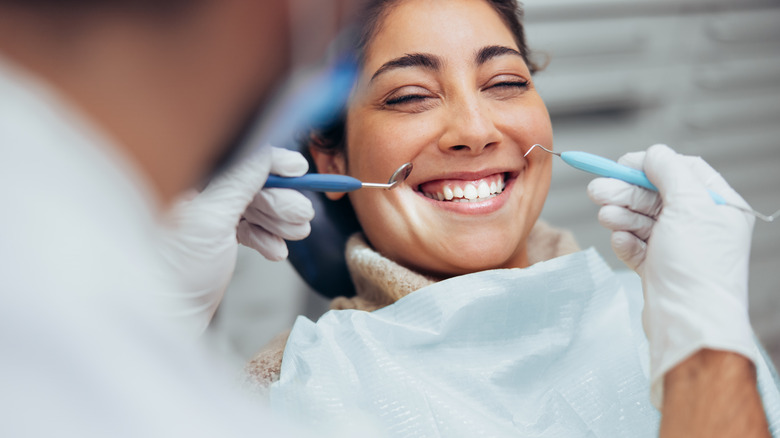When You Don't Brush Your Teeth Before Bed, This Is What Happens
We're all told to brush our teeth in the morning and again at night. But sometimes after a long day, all we want to do is collapse onto our beds. So is it really that bad to skip brushing our teeth at night? According to experts, yes. Every time we eat during the day, bacteria gets caught on our teeth and stays there until we clean our mouths. All that bacteria contributes bad breath, cavities, and more. "The most common preventable disease is dental caries [dental cavity], which is caused by the bacteria Streptococcus mutans," Alex Shalman, cosmetic dentist and clinical instructor at NYU College of Dentistry, told Vice. "While we all have the S. mutans bacteria in our mouth...it thrives mostly in an acidic environment."
The only way to remove that bacteria is to brush our teeth. According to the American Dental Association (ADA), you should brush your teeth two times per day. Brush your teeth for at least two minutes and don't forget to floss once per day to clean between your teeth.
How your teeth affect your overall health
Not everyone knows that the health of your teeth and gums affects your overall health. If you neglect proper dental care like brushing and flossing your teeth, the bacteria in your mouth will continue to accumulate over time. This bacteria will attack the teeth and lead to cavities, gum disease, tooth decay, and other oral problems. When left untreated, these health issues can affect the rest of the body by allowing bacteria to enter the digestive and respiratory tracts and spread to other areas (via Mayo Clinic).
Some conditions linked to poor oral health include heart disease, pneumonia, pregnancy complications, and endocarditis. On the other end, some health conditions may contribute to poor oral health and make it more likely for bacteria to grow in the mouth and cause other health problems. These conditions include diabetes, HIV/AIDs, some types of cancer, and osteoporosis. Let your dentist know if you have any of these conditions so they can create a personalized dental care plan for you to keep your mouth as healthy as possible.


